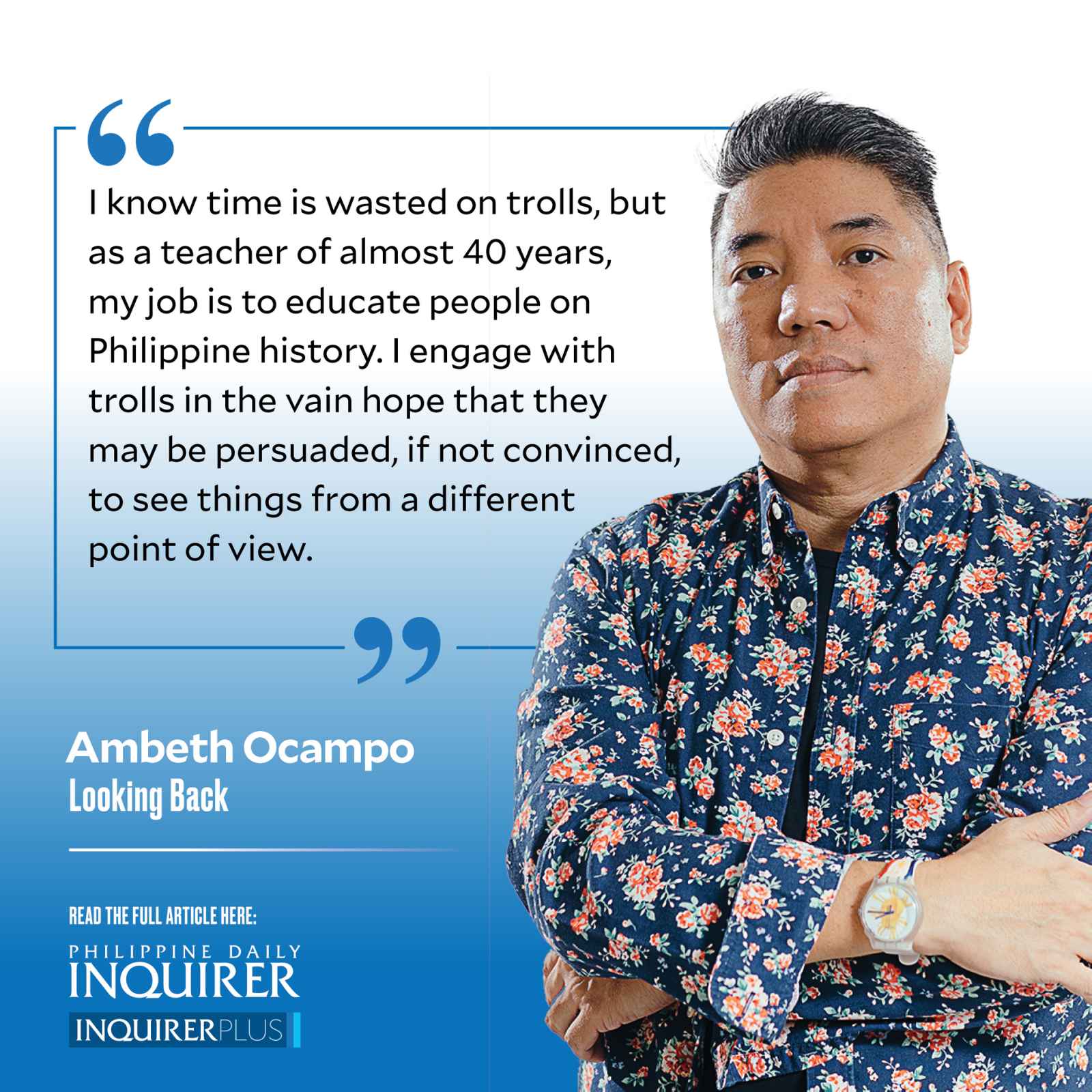Trolls and trolling
A generation who came of age before the internet knows trolls as small, ugly creatures that lurk in Nordic folklore. A troll could also be a nude, rubber doll with long hair, in various colors, stroked for good luck. Like déjà vu, some see a Troll doll in President Duterte. The internet troll is more malevolent; it posts angry, sarcastic, or idiotic comments on social media posts to disrupt a thread. To incite a negative emotional reaction, they often pick fights online using foul language and personal attacks. My Facebook page gets trolled each time I post an Inquirer column on the Marcoses.
Compared with celebrities and movie stars, my Facebook page is modest, with a mere 145,000 organic followers. These are impressive numbers for a historian, and FB incessantly tempts me to triple my following by paying to boost the page, but I am happy as is. Friends warn me that FB is for “tanders” or seniors like me and recommend migrating to other platforms with a younger demographic. Unfortunately, my long-running Inquirer column is a habit and I can’t do Twitter with an attention span of 280 characters though Teddy Boy Locsin and Raquel Fortun seem to have mastered it. Good heavens, TikTok? Let’s leave the dirty dancing to Harry Roque who returns to obscurity after the elections.
Article continues after this advertisementI knew my page was getting noticed after offers for paid ads on my page or me endorsing products rolled and then South Asian scammers targeted the page with ads as comments. These were easily dispensed with when reported as spam, so they went around the system and tagged comments with an ad or offer initially in English and later in Filipino. Weeding these out was time-consuming, and I am glad FB made it possible to ban them permanently even if they open another FB account. With a mere 15,100 followers on Instagram, I am far from “influencer” status and cannot monetize. YouTube promises monetization, but I need professional editing to add to my present nine videos and 2,730 subscribers.
A friend recently referred to me as “patola,” not silk squash or ribbed loofah, because I engaged or “made patol” the trolls on my page. I shared a screenshot of a recent exchange that received 24,000 likes and even migrated to Twitter. Not content with commenting on a link to my Inquirer column on references to Ferdinand Marcos Jr. in his father’s diaries, this troll commented this on a post that had nothing to do with Marcos:
Troll: “Mr. Ocampo, don’t try to connect again your historical footnotes to put BBMarcos in a bad light. Your political yellow bias is obvious.
Article continues after this advertisementMe: “[Name of Troll] history is there, if you can supply evidence otherwise I’d be interested to see them and stand corrected. What I shared recently were Ferdinand Marcos Sr.’s handwritten comments on his son. Would you say the father was yellow and biased?
Troll: “Ambeth R. Ocampo the problem with you is you interpret FM’s diary to put BBM in a bad light, that shows your yellow bias. A Historian should not take sides when lecturing his students. Let them develop critical thinking. The problem with you is you promote your yellow agenda.
Me: “[Name of Troll] please learn to read and understand that I am QUOTING directly from Ferdinand Marcos’ diaries, I am not (mis)interpreting as you claim. Anyway, if I follow your line of reasoning, are you saying Ferdinand Marcos Sr. is a liar? Are you implying that you know Ferdinand Marcos Jr. way better than his own father?”
Social media is a chore; the beast has to be fed daily. It has to be maintained with me responding to comments, likes, shares, and private messages. I know time is wasted on trolls, but as a teacher of almost 40 years, my job is to educate people on Philippine history. I engage with trolls in the vain hope that they may be persuaded, if not convinced, to see things from a different point of view. Unlike my colleagues in academia, I decided long ago to teach and write outside the university. I lecture outside the classroom. I write for the Inquirer instead of refereed academic journals that speak to the converted. I do not join the chorus who blame textbooks and formal education for our short memories and uncritical reading of history because social media is the new arena and cannot be left to trolls and self-appointed “historians” and “experts.”
—————-
Comments are welcome at aocampo@ateneo.edu

















